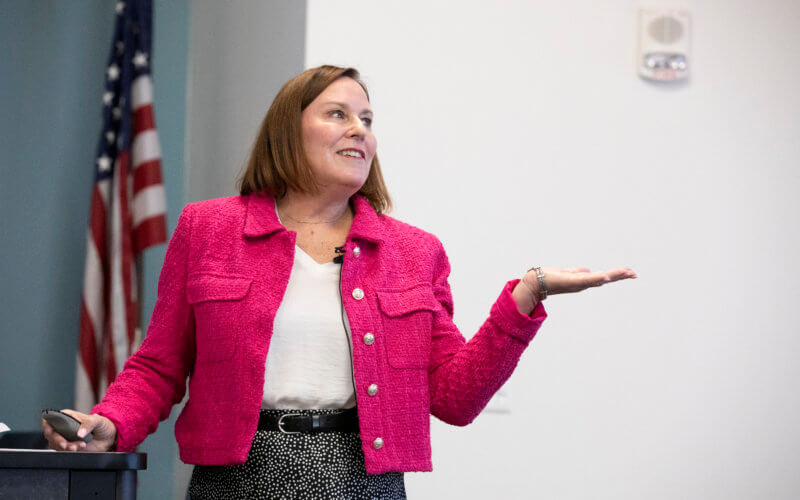
Cal State Fullerton’s 2023 Outstanding Professor Janice Myck-Wayne knows firsthand what it’s like to live with a disability. She was born profoundly deaf in her left ear.
It wasn’t until she enrolled in a deaf and hard of hearing credential and master’s program that she realized she had not received educational support during her own childhood.
Myck-Wayne, professor of special education, shared her journey to becoming a special education teacher while highlighting the progress made in educating students with disabilities at her 2023 Outstanding Professor Lecture.
Her lecture, “From Segregation to Inclusion, the Progression of Equity in Disability Education,” explored the past, present and future possibilities to provide “the best education to all our children” despite the many challenges in achieving equity.
“Over the span of four decades, Dr. Janice Myck-Wayne’s professional accomplishments have shaped the trajectory of special education in California and equipped hundreds of educators with the tools and insights needed to support young children with disabilities and their families,” said CSUF President Sylvia Alva.
“Her leadership, mentorship and scholarly endeavors have left an indelible mark on the educational landscape, inspiring colleagues and student-teachers alike to champion the needs of students.”
The Trajectory of Disability Education
The early childhood educator, who joined the College of Education in 2007, started her career teaching deaf and hard-of-hearing students in the Los Angeles Unified School District.
“My various professional experiences have only strengthened my belief that many of the systemic barriers that face students with disabilities can be traced back to a primary cause: Other people’s assumptions about what people with disabilities can or cannot do,” she said.
Myck-Wayne discussed the trajectory of disability education, beginning with the Individuals with Disability Education Act, which was established nearly a half-century ago.
“In adopting this landmark civil rights measure, Congress opened public school doors for millions of children with disabilities and laid the foundation of the country’s commitment to ensuring that children with disabilities have opportunities to develop their talents, share their gifts and contribute to their communities,” she said.
Myck-Wayne said before this law was passed, children with disabilities had few educational opportunities.
In the 1970s, for example, U.S. schools educated only one in five children with disabilities, and many states had laws excluding children who were deaf, blind, emotionally disturbed or had an intellectual disability.
“If you were in public schools before the 1980s, you most likely did not go to school with a peer with a disability. I know I had no peers in my K-12 schooling who had a diagnosed disability.”
Myck-Wayne said despite progress made, special education — and education as a whole — is plagued with systemic racism, ableism and other discriminatory practices that exist in society overall.
“Ongoing efforts involve addressing attitudinal barriers, refining inclusive teaching practices, and continually evolving policies to meet the diverse needs of all students,” said Myck-Wayne, who earned a doctorate in education from USC.
The Benefits of Inclusive Classrooms
Myck-Wayne relayed that research shows that students with and without disabilities benefit from learning alongside each other in general education classrooms.
“My work at CSUF has been to prepare early childhood special education teachers to teach our youngest, most vulnerable children in inclusive environments, yet many programs for preschool children continue to be in segregated settings,” said Myck-Wayne, whose research interests include Deaf education.
“I consistently pose the question: ‘If we can’t include very young children, then how will we include students in later grades?’”
She then challenged colleagues and others that collaboration is needed to implement inclusive practices.
“People with disabilities, families of children with disabilities and special educators have been working to move the momentum toward inclusivity. How do we engage all partners in this goal? When does it become the responsibility of the rest of the people in education and our community?
“We should all strive to make everyone feel included.”